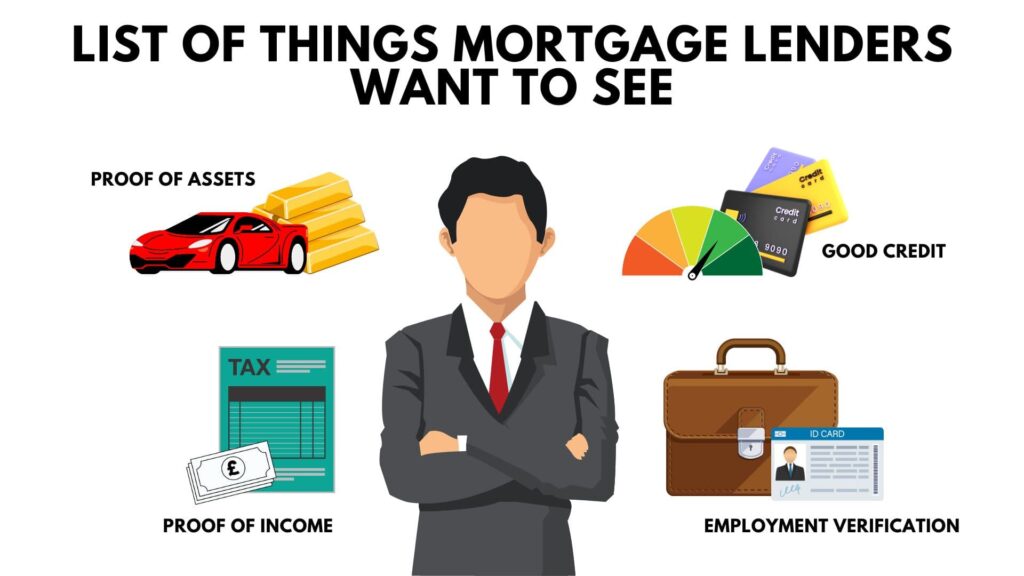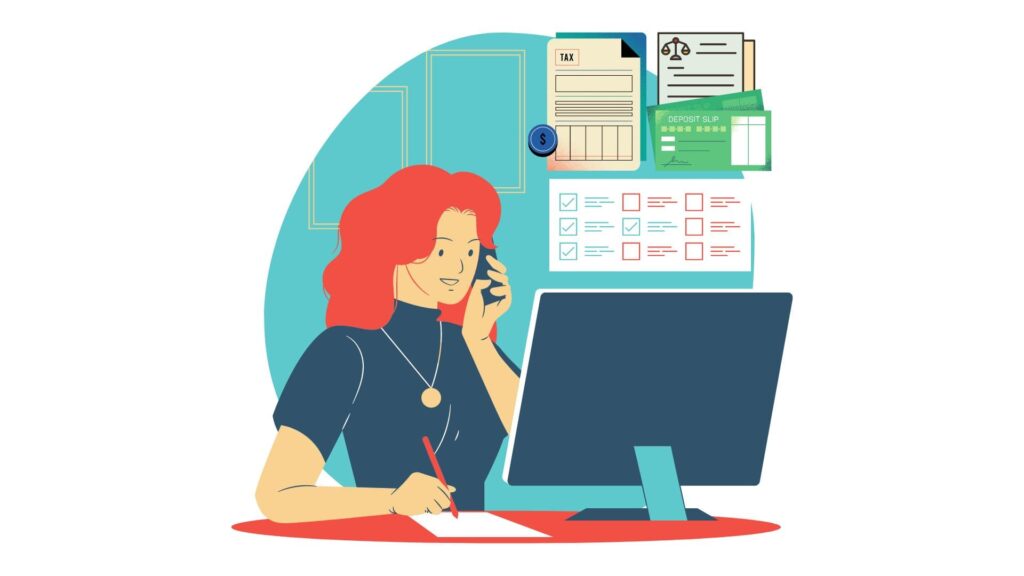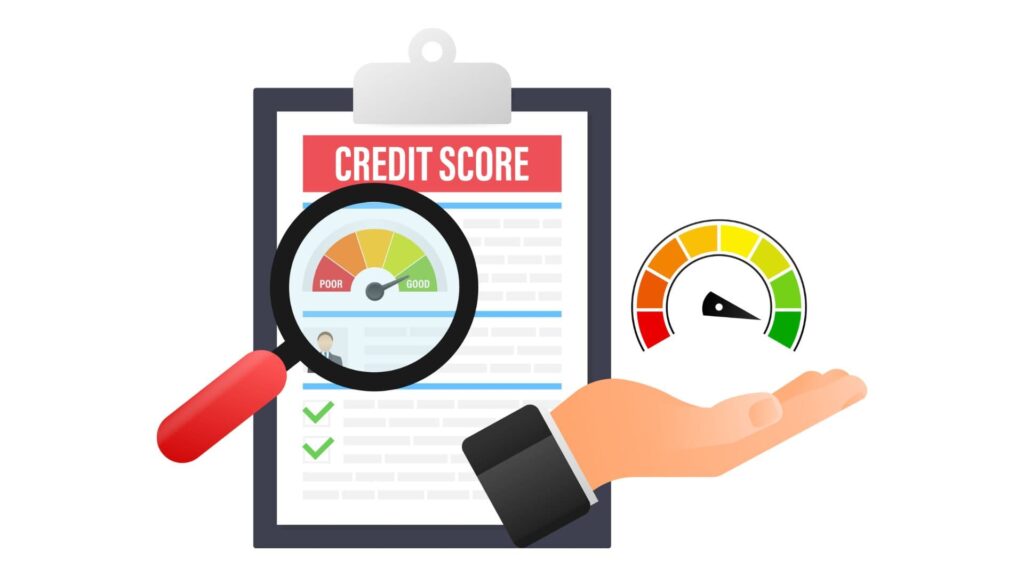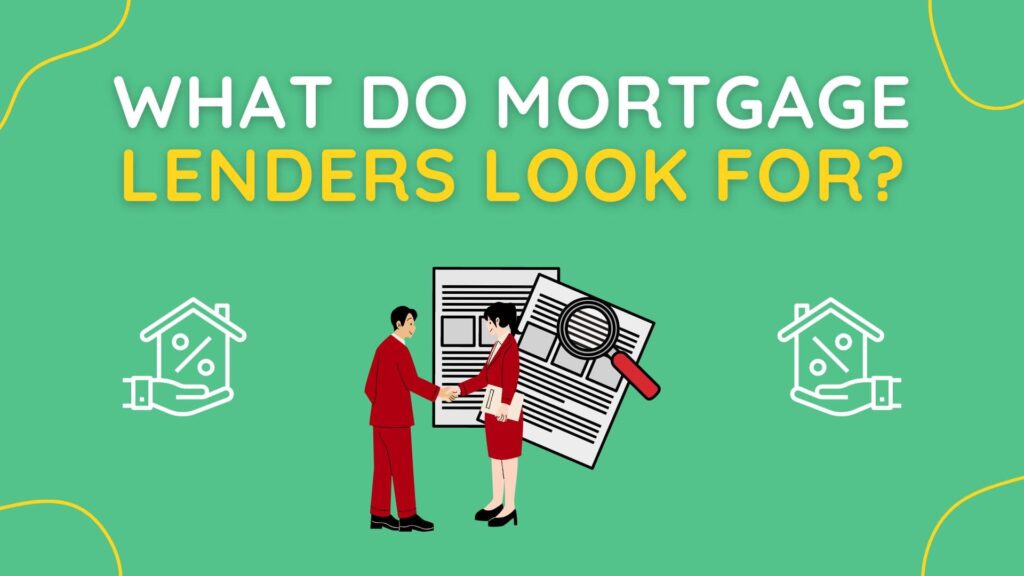
Sammie Ellard-King
I’m Sammie, a money expert and business owner passionate about helping you take control of your wallet. My mission with Up the Gains is to create a safe space to help improve your finances, cut your costs and make you feel good while doing it.

Quickfire Roundup:
When it comes to buying a house, it helps to know what mortgage lenders look for.
In a nutshell, it’s all about them finding evidence that shows you can meet monthly mortgage payments.
That means that they will look at the likes of your credit report, your income and bank statements.
In fact, they’ll want to check out anything that shows your suitability, or otherwise, for a mortgage loan
If you’re applying for a mortgage or thinking of applying soon, knowing what to expect is useful.
What do mortgage lenders look for when buying a house, and how can you boost your chances of acceptance?
That’s what I’m going to look at in this article so that you can be as best prepared as possible when it comes to completing your mortgage application.
Boon Brokers are one of the UKs leading online mortgage brokers. They have a 5-star excellent Trustpilot rating with over 543 reviews.
- No mortgage fees
- Whole of market access
- Free online consultations
- Directly authorised by the FCA
- No in person meet ups
Table of Contents
What do mortgage lenders look for when buying a house?
When applying for a mortgage, lenders are looking for proof that you can afford the mortgage repayments.
They need to build a picture showing all about your income, how you manage your money and your credit history.
Unsurprisingly, it’s not enough to just tell a potential lender what you earn or that you have a glowing credit report.
A mortgage lender will want to see things such as bank statements, your credit rating and other debts you have.
They’ll also want to look at savings accounts to show that you have enough for the down payment that covers your deposit.

Income Levels
Your income is obiously the biggest factor that lenders will take into consideration.
So, how much do I need to earn for a mortgage?
Well, simply put it’s 4-5 times your yearly gross income.
Usually it’s somewhere in the middle but that’s very much the benchmark that lenders look at.
What if I'm self-employed?
If you are employed, proving your income is relatively easy. That’s because you’ll have payslips, a P60 and bank statements that show your regular cash flow.
This is all good news as it means that a mortgage provider can quickly assess what monthly mortgage payment is affordable. Couple that with a positive credit history, and you’re in a good position.
Being self-employed presents other challenges. While you can still provide bank statements, it’s not quite as straightforward to establish exactly what you earn and the monthly mortgage payments that would be affordable.
Most lenders will require at least 2 years’ worth of accounts, SA302 forms or a tax year overview, and bank statements.
Boon Brokers are one of the UKs leading online mortgage brokers. They have a 5-star excellent Trustpilot rating with over 543 reviews.
- No mortgage fees
- Whole of market access
- Free online consultations
- Directly authorised by the FCA
- No in person meet ups
What will lenders typically check?
Mortgage lenders have their own lending criteria, and it varies from one lender to the next.
However, most mortgage lenders will look at similar factors.
These include:
- Your income
- Debt to income ratio
- Your credit report – obviously a good credit history will help
- Assets – what else do you own that provides a degree of financial stability
- Deposit – how big is the down payment you can make?
It may be frustrating that mortgage companies want so much information. However, from their side, there is always a degree of risk.
By assessing your financial history and personal circumstances, they’re able to mitigate this risk. Mortgage lenders check what they do to protect their businesses.
What about for a second home?
When considering a mortgage application for a second home, lenders in the UK want to ensure that the applicant has the financial capacity to support multiple mortgages.
They will assess the applicant’s income and employment status to ensure they have a stable financial position, and they will require a significant deposit to be paid upfront.
The amount of deposit required will depend on the lender and the property’s value, but it is usually around 25% of the purchase price.
Additionally, lenders will also evaluate the property being purchased to ensure that it is a viable investment. This includes assessing its location, property type, and potential rental income.
If the property is intended for rental purposes, the lender may also consider the applicant’s experience as a landlord.
Overall, mortgage lenders in the UK thoroughly evaluate an applicant’s financial position and the property’s investment potential before approving a second home mortgage.
What do mortgage companies need from self-employed applicants?

When you’re self-employed, mortgage lenders still need to look at your circumstances as a whole. It’s just that they use different documents to do this.
While bank statements and your credit report will be checked, just like when an employed person applies, they then need to look closer at your income. They do this by requesting:
- Tax returns to establish monthly income
- Signed company accounts if you run a limited company
- A reference from your accountant
It’s worth pointing out that a mortgage broker is well worth using when you’re self-employed.
They will be able to direct you to lenders who are more likely to accept you and they’ll work to get you the best deal and interest rates.
Should I lie about my income?
In a word, no. To start with, you’ll be handing over around 3 months’ bank statements that will clearly show what you have coming in.
Faking a bank statement would be more than just a little tricky. Your other options would be to fake payslips or your tax returns.
If you do go down this line, just be prepared for the fact that you’ll more than likely get caught.
Whether or not you get prosecuted is one thing, but a guarantee is that you’ll be barred from applying for a mortgage in the future.
What can mortgage lenders see?
Mortgage lenders have a pretty clear picture of your personal finances as your bank statements, credit reports and payslips are pretty clear indicators.
You will also need to supply a proof of credit cards, loans and other 3rd party payments that are outstanding.
This data will generally match up with your credit report following on from the previous section about why you shouldn’t lie to a mortgage lender.
How many bank statements are needed for a mortgage application?
As we’ve seen, mortgage lenders look to see if potential mortgage payments would be affordable.
A significant part of this involves looking at your bank statements so that they can get an idea of your spending habits.
A single bank statement isn’t really enough to show any pattern and that’s why most mortgage lenders will ask for 3 months’ worth.
Your bank account statements will be used to take a look at your income and outgoings. This could include utility bills and other payments that leave your account regularly.
This all builds a picture and shows potential lenders if you’re a good risk.
You can help yourself by carefully managing your bank accounts in the months leading up to applying and ensuring that you stay out of the red.
What do mortgage lenders look at on my credit report?

By looking at your credit report, a mortgage lender can get a snapshot of your financial situation.
Yes, you provide bank statements to display your financial situation, but your credit report shows how you manage debt. The factors that lenders look at include:
- Credit history – your level of borrowing, what’s outstanding and the monthly payments
- Negative markers – County Court Judgements (CCJs) and bankruptcy
- Credit utilisation – how much credit are you using as a percentage of what’s open to you
- Poor management – late payments as well as missed ones
Boon Brokers are one of the UKs leading online mortgage brokers. They have a 5-star excellent Trustpilot rating with over 543 reviews.
- No mortgage fees
- Whole of market access
- Free online consultations
- Directly authorised by the FCA
- No in person meet ups
What credit scores will mortgage lenders be happy with?
This might surprise you but mortgage lenders can’t see credit scores. In fact, no lender can.
A credit score is a number given to show you how healthy, or otherwise, your credit is.
A mortgage company, as well as other credit providers, get to see your payment history, how you’ve managed accounts and what you still owe, but they don’t ever see a credit score.
Of course, when it comes to mortgage applications, you need your credit to appear as healthy as possible.
The use of a credit score allows you to see how you’re performing.
There are 3 credit reference agencies in the UK and they allocate a credit score slightly differently:
- Experian – scores from 0 – 999 with 759 classed as average/fair
- TransUnion – score from 0 – 710 with 610 being average
- Equifax – score from 0 – 700 with 380 being average
If you do have bad credit, all is not lost. By using a specialist mortgage broker you may be able to secure a bad credit mortgage.
What assets will mortgage lenders consider?

When you look at buying a house, it’s generally the biggest purchase that anyone will ever make, and this means that the loan amount of a mortgage is usually quite high.
While lenders are keen to check your monthly income and cash flow, they will also consider certain assets.
Why? Well, if you were in trouble at any point, these could be sold/used to cover the monthly mortgage payments.
Assets that lenders will consider include:
- Cash in savings accounts
- Property
- Artwork
- Jewellery
- Cars
What to look for in a mortgage lender?
Something you should look for in a mortgage lender is there ability to let overpay and also what the exit fees are like.
If a lender is flexible here this can give you the ability to bring down your mortgage term without an early repayment charge.
For me, I also want to ensure they are regulated by the FCA and have trustworthy reviews on platforms like Trustpilot.
FAQs
What will stop me from getting a mortgage?
Your loan application will contain the details that lenders need to make a decision. If they find that you have a poor track record, when it comes to managing money, it may be harder for you to secure a mortgage.
Failing to demonstrate that you can meet the mortgage payments will also cause an issue. Big red flags to lenders are CCJs and bankruptcy.
We have a guide about what stops you from getting a mortgage right here.
How much debt is okay to secure a mortgage?
Lenders will look at your debt-to-income ratio. This is a number that shows your level of debt as a percentage of your income.
Lenders like this number to be as low as possible as it shows that you are good at money management.
Try not to take on new debt if you’re planning on applying for a mortgage in the near future.
Do mortgage lenders check bank statements?
Yes, all mortgage lenders will check bank statements. Usually they ask for the last 3 months worth of statements but have been known to ask for more if there is discrepancies.
What do mortgage lenders look for on bank statements?
Mortgage lenders are ensuring a few key things on your bank statements such as income, debt payments, spending habits, disposable income, savings and more.
Should you have things like gambling or compulsive spending habits this can be a red flag.
Final thoughts
So, when it comes to thinking about, “What do mortgage lenders look for when buying a house?”, you now have a very clear idea of the types of factors that they will check.
While self-employment may mean a slightly different process, ultimately all that a lender is looking for is proof that you can pay going forward.
Share on social media
Disclaimer: Content on this page is for informational purposes and does not constitute financial advice. Always do your own research before making a financially related decision.
Lorem ipsum dolor sit amet, consectetur adipiscing elit. Ut elit tellus, luctus nec ullamcorper mattis, pulvinar dapibus leo.



